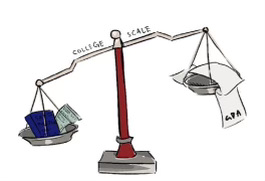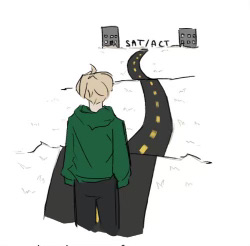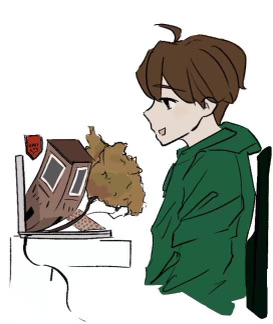A world of uncertainty: students reflect on the college application process during the pandemic

Colleges have prioritized overall GPA over test scores, unlike previous years.
May 19, 2021
Looking back at her experience completing her college applications earlier in the year, Stephanie Shen (12) remembers it as a process filled with the general emotions suffused within the pandemic: longing, uncertainty and searching for hope. Although she wasn’t able to bond with the seniors around her in the ways she anticipated, she found modes of staying connected with her friends, even if the experience wasn’t the same as it could have been in previous years.
“I do remember seeing seniors rant together about how they have made no progress on their personal statements,” Stephanie said. “I feel like I did miss out a little bit on that, but we did have some FaceTime [for] just struggling together, editing each other’s essays. It was a slightly more lonely process this year.”
For the first time, seniors have had to navigate the stress of college applications during a pandemic. As students like Stephanie have found ways to connect back with the world around them, upper school head college counselor Nicole Burrell notes that the new circumstances of the pandemic have created additional unpredictability.

“There’s always uncertainty [regarding the college application process] when you come into it as a student or as a parent or as a family because usually you’re going through it once: the first and only time you’ll ever do [it],” Burrell said. “This last year has just exacerbated that uncertainty because there are so many unknown factors out there that no one knows the answers to.”
One aspect of the college admissions process that changed was the use of test scores, which Burrell mentions could create uncertainty for students who had been primed to view standardized testing as a rite of passage in high school.
“It’s the first time in the history of college admissions where test scores just aren’t being considered in the way that they have in the past,” Burrell said. “A lot of students have certainly heard about these [standardized tests] for many many years now and are expecting that to play a really important role to be told all of a sudden, ‘Whoops nope sorry. No, they’re not anymore.’”
Test scores have also been difficult to obtain by the lack of testing available during the pandemic. Tristan Goodwin (11) had prepared to take standardized tests early on in high school but found himself only being able to in his junior year.
“The biggest change for me was with the SAT and SAT Subject Tests. I had a few scheduled for almost a year ago, and they kept on getting canceled,” Tristan said. “I wasn’t able to do the actual SAT test until [Tuesday, April 27] and that was quite difficult.”
Because of how much the pandemic limited travel, students found it difficult to visit schools they were interested in.

“It was kind of like shooting in the dark a little bit because you couldn’t go into all these places early on in the year and tour the schools early on to can see and visualize them,” Ryan Tobin (12) said. “You couldn’t have that firsthand experience that a lot of people are looking for.”
Although college tours did not take place in the same way they would during a normal school year, colleges compensated by beginning to curate and spend time with more extensive online offerings, such as virtual tours and information sessions.
Burrell has found that this trend has trickled down to the upper school’s college counseling office, which is planning to continue to make use of some online environments during the next school year.
“Some things that work well in this [online] environment we will continue even once things opened up,” Burrell said. “We were talking to some college admission counterparts who expressed the same thing: they said ‘We’ve devoted a lot of resources to creating online content.’”
With the difficulty of staying at home and primarily using online environments, Ryan hopes to find new ways to interact with his peers in college.
“I’m actually really excited because the schools I’m thinking of going to hope to have their COVID-19 [situation] dealt with by the fall,” Ryan said. “I feel like it’s going to be a lot more social and everyone’s just going to want to get involved in everything, and I feel like that’s really important in college because you’re going to someplace new, you’re going to meet a bunch of new people.”
When students began making their final decisions last month on where to commit, Sydney Takemoto (12) appreciated and found solace in her peers and their support.

“People have been grateful where they’ve gotten in and supported others where they’re getting in,” Sydney said. “This year there were a ton of challenges, and I feel like everybody is just super proud and supportive of their classmates and themselves. I think that my grade has gone through a lot in general.”
For the next school year, in which the juniors begin the process of applying to college, upper school college counselor Martin Walsh expects the trends of this year’s college process to continue and emphasizes the importance of students to research and look into the process carefully.
“Next year I’m expecting another test optional year. I’m expecting record numbers of applications to universities,” Walsh said. “I’m expecting that colleges will rely on early decisions to fill up or get their guaranteed yield. I’m hoping that our kids will do a really good job of researching colleges and maybe try to create lists that have a bit more diversity.”


















![“[Building nerf blasters] became this outlet of creativity for me that hasn't been matched by anything else. The process [of] making a build complete to your desire is such a painstakingly difficult process, but I've had to learn from [the skills needed from] soldering to proper painting. There's so many different options for everything, if you think about it, it exists. The best part is [that] if it doesn't exist, you can build it yourself," Ishaan Parate said.](https://harkeraquila.com/wp-content/uploads/2022/08/DSC_8149-900x604.jpg)




![“When I came into high school, I was ready to be a follower. But DECA was a game changer for me. It helped me overcome my fear of public speaking, and it's played such a major role in who I've become today. To be able to successfully lead a chapter of 150 students, an officer team and be one of the upperclassmen I once really admired is something I'm [really] proud of,” Anvitha Tummala ('21) said.](https://harkeraquila.com/wp-content/uploads/2021/07/Screen-Shot-2021-07-25-at-9.50.05-AM-900x594.png)







![“I think getting up in the morning and having a sense of purpose [is exciting]. I think without a certain amount of drive, life is kind of obsolete and mundane, and I think having that every single day is what makes each day unique and kind of makes life exciting,” Neymika Jain (12) said.](https://harkeraquila.com/wp-content/uploads/2017/06/Screen-Shot-2017-06-03-at-4.54.16-PM.png)








![“My slogan is ‘slow feet, don’t eat, and I’m hungry.’ You need to run fast to get where you are–you aren't going to get those championships if you aren't fast,” Angel Cervantes (12) said. “I want to do well in school on my tests and in track and win championships for my team. I live by that, [and] I can do that anywhere: in the classroom or on the field.”](https://harkeraquila.com/wp-content/uploads/2018/06/DSC5146-900x601.jpg)
![“[Volleyball has] taught me how to fall correctly, and another thing it taught is that you don’t have to be the best at something to be good at it. If you just hit the ball in a smart way, then it still scores points and you’re good at it. You could be a background player and still make a much bigger impact on the team than you would think,” Anya Gert (’20) said.](https://harkeraquila.com/wp-content/uploads/2020/06/AnnaGert_JinTuan_HoHPhotoEdited-600x900.jpeg)

![“I'm not nearly there yet, but [my confidence has] definitely been getting better since I was pretty shy and timid coming into Harker my freshman year. I know that there's a lot of people that are really confident in what they do, and I really admire them. Everyone's so driven and that has really pushed me to kind of try to find my own place in high school and be more confident,” Alyssa Huang (’20) said.](https://harkeraquila.com/wp-content/uploads/2020/06/AlyssaHuang_EmilyChen_HoHPhoto-900x749.jpeg)






